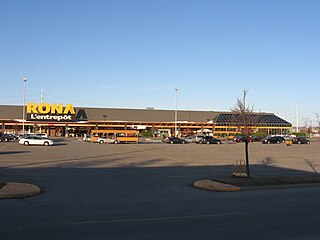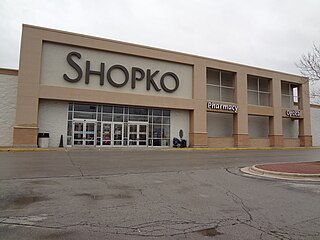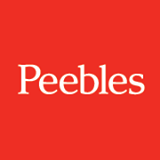Related Research Articles

Macy's, Inc. is an American holding company of department stores. Upon its establishment in 1929, Federated held ownership of the regional department store chains Abraham & Straus, Lazarus, Filene's, and Shillito's. Bloomingdale's joined Federated Department Stores the next year. Throughout its early history, frequent acquisitions and divestitures saw the company operate a number of nameplates. In 1994, Federated took over Macy's, the old department store chain originally founded in 1858 by American entrepreneur Rowland Hussey Macy. Despite Federated's long history of preserving regional nameplates, its acquisition of the May Department Stores Company in 2005 marked the end of those nameplates. By the following year, both the Macy's and Bloomingdale's brands had replaced them nationwide. Ultimately, Federated itself was renamed Macy's, Inc. in 2007, an acknowledgment of the old store's venerable name.

Bed Bath & Beyond was an American big-box retail chain specializing in housewares, furniture, and specialty items. Headquartered in Union, New Jersey, the chain operated stores in the United States and Canada, and was once counted among the Fortune 500 and the Forbes Global 2000. The chain filed for Chapter 11 bankruptcy in April 2023 and liquidated all of its remaining stores, with the last closing on July 30, 2023. Following the retail chain's liquidation, its name was adopted by online retailer Overstock.com, which acquired the company's trademarks in a bankruptcy auction. The name is also still used by the chain's former Mexican division, which is now independent.

Rona, Inc. is a Canadian retailer of home improvement and construction products and services, owned by U.S.-based private equity firm Sycamore Partners. Founded in 1939, the company operates a mixture of company-owned and franchised retailers under multiple banners, including Rona, its big box formats Rona Home & Garden, Rona+, as well as smaller brands such as Rona Cashway, Moffatt & Powell and Dick's Lumber.
The True Value Company is an American wholesaler and Hardware store brand. The corporate headquarters are located in Chicago.

Broadway Stores, Inc., was an American retailer based in Southern California. Known through its history as Carter Hawley Hale Stores and Broadway Hale Stores over time, it acquired other retail store chains in regions outside its California home base and became in certain retail sectors a regional and national retailer in the 1970s and 1980s. The company was able to survive takeover attempts in 1984 and 1986, and also a Chapter 11 bankruptcy filing in 1991 by selling off most of its assets until August 1995 when its banks refused to advance enough additional credit in order for the company to be able to pay off suppliers. At that point, the company sold itself to Federated Department Stores for $1.6 billion with the acquisition being completed on October 12, 1995.

Shopko was a chain of department stores based in Green Bay, Wisconsin. All locations closed on June 23, 2019, with the exception of the Shopko Optical locations, which continue to operate.
Carson Pirie Scott & Co. is an American department store that was founded in 1854, which grew to over 50 locations, primarily in the Midwestern United States. It was sold to the holding company of Bon-Ton in 2006, but still operated under the Carson name. The entire Bon-Ton collection of stores, including Carson's, went into bankruptcy and closed in 2018. Bon-Ton's intellectual property was quickly sold while in bankruptcy, and the new owners reopened shortly afterwards as a BrandX virtual retailer.
Payless ShoeSource Worldwide, LLC, is an American multinational discount footwear chain. Established in 1956 by cousins Louis and Shaol Pozez, Payless was a privately held company owned by Blum Capital, and Golden Gate Capital. In 1961, it became a public company as the Volume Shoe Corporation, which merged with The May Department Stores Company in 1979. In the 1980s, Payless was widely known in the U.S. for its Pro Wings line of discount sneakers, which often had Velcro straps instead of laces. In 1996, Payless became an independent publicly held company. In 2004, Payless announced it would exit the Parade chain and would close 100 Payless Shoe outlets. On August 17, 2007, the company acquired the Stride Rite Corporation and changed its name to Collective Brands, Inc. As of 2020, Payless is owned by a group of investors led by Alden Global Capital and Axar Capital Management.
Pay 'n Save was a retail company founded by Monte Lafayette Bean in Seattle, Washington, in 1940. Over the years, Pay 'n Save was the leading drugstore chain in Washington and was the owner of several Washington-based retailers, including Lamonts and Ernst. A 1984 sale of the company to The Trump Group and a 1986 attempt to transform the retailer into a bargain-basement merchandiser resulted in a loss of nearly $50 million. By 1988, Pay 'n Save was sold to Thrifty Corporation, who later sold the stores to PayLess Drug, who retired the Pay 'n Save name. As a result, most of the retailer's divisions were spun off as separate companies or shuttered. As of 2023, Pay 'n Save's membership discount chain, Bi-Mart, is the sole surviving division of the company.

Foot Locker, Inc. is an American multinational sportswear and footwear retailer headquartered in Midtown Manhattan, New York City, and operating in over 40 countries.
Skaggs Companies was the predecessor to many famous United States retailing chains, including Safeway, Albertsons, Osco Drug, and Longs Drugs. The company owned several drugstore chains, but all of them were sold. Skaggs Cos. became American Stores in 1979.

Thrifty PayLess Holdings, Inc. was a pharmacy holding company that owned the Thrifty Drugs and PayLess Drug Stores chains in the western United States. The combined company was formed in April 1994 when Los Angeles–based TCH Corporation, the parent company of Thrifty Corporation and Thrifty Drug Stores, Inc., acquired the Kmart subsidiary PayLess Drug Stores Northwest, Inc. At the time of the merger, TCH Corporation was renamed Thrifty PayLess Holdings, Inc. and Thrifty operated 495 stores, PayLess operated 543 stores.

Peebles was an American chain of department stores owned by Stage Stores, Inc. and headquartered in Houston, Texas.

Beaver Lumber was a Canadian building supply chain owned by Molson. It was once Canada's fourth largest building supply chain with 138 stores. In 2000 it was purchased by Home Hardware, a cooperative of over 1000 independent Canadian hardware stores. Beaver Lumber stores were rebranded as Home Building Centres.
Camelot Music was a mall-based American retailer of prerecorded music and accessories and was one of the largest music retailers in the United States based on store count. Camelot specialized in the sales of prerecorded music, especially vinyl LP, 45-rpm records, cassette tapes, CDs, and video/music accessories.
Golfsmith International Holdings Inc. was an American golf specialty retailer based in Austin, Texas. Each store, along with golfsmith.com, housed a wide selection of golf clubs, shoes, apparel, gadgets and gear from all the major brands as well as proprietary offerings. They also offered custom club fitting, lessons and services for golfers.

Mattress Firm, Inc. is an American mattress store chain founded on July 4, 1986. The headquarters of the company is located in Houston, Texas.
Wickes Companies was a diversified manufacturing and retail conglomerate. It renamed itself after its subsidiary Collins & Aikman in 1992. The company ceased operations in 2007.
R.P. Home & Harvest, formerly known as Big R Stores and Stock + Field, was an American retail store specializing in supplies for farming and agriculture, currently being rebranded. It was founded in 1964 in Watseka, Illinois. Although the chain began to undergo liquidation in January 2021, its stores were purchased by R. P. Lumber in March. In April 2023, Runnings, a Minnesota-based retailer acquired the chain with plans to rebrand all the stores by 2024.
References
- 1 2 "Form 10-K November 30, 1996". U.S. Securities and Exchange Commission . Payless Cashways. November 30, 1996.
- 1 2 "Payless Cashways Files for Chapter 11 Protection". New York Times. July 22, 1997. Retrieved May 3, 2012.
- ↑ "Payless Cashways Inc. To Buy California Firm". Wall Street Journal . December 14, 1982. p. 21. ProQuest 134639230.
Payless Cashways Inc. said it agreed to buy Lumberjack Stores Inc., a closely held retailer, for $26.3 million.
- ↑ Peterson, Marguaret (September 18, 1984). "Payless Cashways Foresees An Upturn Following 'flattish' Year And Slow Start With Capital Lumberjack Stores" . Sacramento Bee . p. AA7.
Payless Cashways, corporate parent of Lumberjack Stores, Monday acknowledged it has had problems in taking over the Sacramento chain, faces new high-volume, warehouse competitors and generally is having a very flattish year... The fast-growing Payless has 147 stores operating under five names in 17 states, will open 20 more stores in 1984 and plans another 20 in 1985, he said... Payless, which acquired Lumberjack for $26.2 million in January 1983, found it wasn't easy as a formally organized, public company to mesh with a privately held firm whose personnel had an informal outlook, said Tom Stanton, Western regional vice president... The 15-store Lumberjack chain faces a new California competitor in Home Club, a high-volume warehouse operation which plans next spring to open a 100,000-square-foot outlet in Sacramento. That is four times the size of a typical Payless Cashways outlet.
- ↑ "Payless Cashways Gets Definitive Pact to Buy Somerville Lumber". Wall Street Journal . March 12, 1984. p. 18. ProQuest 135005044.
Payless Cashways Inc. said it reached a definitive agreement to buy Somerville Lumber & Supply Co., a closely held Somerville, Mass., concern, for about $39 million in stock.
- ↑ "Payless Cashways Closes Somerville Lumber Purchase". Wall Street Journal . April 4, 1984. p. 46. ProQuest 134974761.
Payless Cashways Inc. said it completed its acquisition of Somerville Lumber & Supply Co. of Somerville, Mass., for about $12 million in stock.
- ↑ St. Anthony, Neal (August 21, 1986). "Payless Cashways agrees to buy Knox Lumber stores" . Minneapolis Star-Tribune . p. 01M.
Payless Cashways, Inc., the Kansas City-based building-material retailer, has agreed to buy St. Paul-based Knox Lumber Co., which only four months ago was purchased from another corporate parent. Terms of the deal, which should close in October, weren't announced following the signing of a letter of intent Wednesday... Payless, founded in 1930, operates 169 stores in 19 states in the Midwest, Southwest and on the Pacific Coast. The company, which is listed on the New York Stock Exchange, had net income of $38 million on 1985 sales of $1.4 billion.
- ↑ St. Anthony, Neal (October 28, 1986). "Knox chief executive replaced as ownership changes hands" . Minneapolis Star-Tribune . p. 10B.
Payless Cashways, Inc., announced Monday that it has completed its acquisition of Knox, which had become an independent only six months ago. Knox will be operated as a Payless subsidiary and retain the Knox name... Knox operates six Twin Cities stores, and a seventh is scheduled to open in Blaine next year. Knox also runs stores in Duluth; Sioux Falls, S.D.; Fargo, N.D., and Billings, Mont. Its headquarters and distribution center are in St. Paul's Midway district.
- ↑ "Payless Cashways, Inc. - Company Profile, Information, Business Description, History, Background Information on Payless Cashways, Inc".
- ↑ "Edelman Group Lifts Payless Stake". New York Times. May 24, 1988. Retrieved May 3, 2012.
- ↑ "Payless Cashways Attracts Foreigner". New York Times. July 9, 1988. Retrieved May 3, 2012.
- ↑ "British Company Seeks Payless Data". New York Times. July 12, 1988. Retrieved May 3, 2012.
- ↑ "Management Buyout Is Approved at Payless". New York Times. July 1, 1988. Retrieved May 3, 2012.
- 1 2 "Two Furrow Stores to Close". Austin Business Journal. September 10, 2011. Retrieved May 3, 2012.
- ↑ "Home Depot Vs. Lowe's". Money Magazine. March 1, 1999. Retrieved May 3, 2012.
- ↑ "Payless Cashways, Inc. - Company Profile, Information, Business Description, History, Background Information on Payless Cashways, Inc".